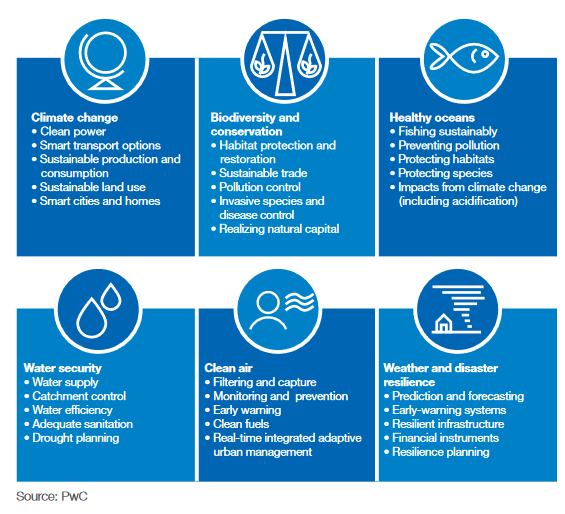The World Economic Forum (WEF), a Swiss-based nonprofit organization focused on “improving the state of the world”, believes that blockchain can play a part in saving the planet. In a recent report, WEF identified as many as 65 use cases for the technology underpinning Bitcoin, in solving the most critical environmental issues and promoting global sustainability.
Blockchain – a Game Changer in Promoting Sustainable Resources Management
The WEF report, titled “Building Block(chain)s for a Better Planet”, has a cautiously optimistic tone, acknowledging that the blockchain technology is still undergoing a maturation process.
“The technology itself is still very new, and there is a considerable way to go to build trust among businesses, investors and regulators in relation to blockchain applications,” states the report. However, it goes on to explain that “as the technology matures and its application across sectors and systems grows, there is both a challenge and an opportunity to realize blockchain’s potential – not just for finance or industry, but for people and the planet. This opportunity comes at a critical juncture in humanity’s development.”
According to the WEF, some of the most pressing environmental challenges today, which the underlying technology behind Bitcoin has a potential to help solve, are:
- Climate change
- Natural disasters
- Biodiversity loss
- Ocean health deterioration
- Air pollution
- Water scarcity

Blockchain- Enabled “Game Changers” for Improving Sustainability
Aside from specifying current challenge areas where blockchain could be applied, WEF also defines specific “game changers”, which represent the combination of blockchain and other Fourth Industrial Revolution tech. According to the report, there are 8 “game changers”, which have the potential to provide disruptive solutions:
“See-through” Supply Chains: taking into account some of the most pressing issues of supply chain management – such as corruption, human rights violations, modern slavery and environmental degradation – there is a growing need for transparency and traceability across the global supply chains. Blockchain technology can help corporations achieve this goal and improve the consumers’ confidence in their operations, by improving monitoring, verification, reporting and exposure of illegal or unethical activities.
Decentralized and sustainable resource management: Centralized systems are increasingly inefficient in matching supply and demand. By creating peer-to-peer transaction systems, it is possible to create a dynamic pricing model for resources and balance demand with supply. Some of the most notable examples would be decentralized energy grids and decentralized water systems.
New Sources of Sustainable Finance: There is a significant gap between available funds and the financing needed for sustainable development goals. The implementation of blockchain-enabled platforms will offer access to new sources of capital, through the tokenization of financial investments which will offer investment opportunities to a larger group of stakeholders.
Incentivizing Circular Economies: Blockchain can be used to encourage economies across the globe to embrace recycling and repurposing of resources previously classified as waste. This type of incentive can also extend to manufacturers, who will be encouraged to create products which can be recycled easier and in a greater proportion.
“As the technology matures and its application across sectors and systems grows, there is both a challenge and an opportunity to realize blockchain’s potential – not just for finance or industry, but for people and the planet.“
Transforming Carbon Market: With the help of blockchain and the introduction of smart contracts, various communities across the globe could trade carbon allocations, either by buying scarce credits or offsets. This would result in a constant overall impact of carbon-intensive products or services on the planet, within the agreed parameters.
Next-gen Sustainability: Blockchain can help corporations improve their sustainability reporting systems and allow for third-party measurement and verification tools, resulting in increased transparency and data authenticity. With automated data collection and processing, through smart contracts, there would be a significant decrease in wrongful reporting and fraud.
Automatic Disaster Preparedness and Humanitarian Relief: Efforts are already being made in this respect, such as IBM’s “Call for Code” initiative in collaboration with American Red Cross, encouraging developers to create applications which help people prepare for natural disasters. Using blockchain solutions and smart contracts will help mobilize communities and coordinate rescue and humanitarian aid efforts in case of natural disasters.
Earth-management Platforms: Blockchain-based platforms could manage and enable market mechanisms that protect the global environmental commons. One such platform is already in development: the Earth Bank of Codes. This project aims to create a global digital platform in which all the natural assets are recorded, specifying their spatial and temporal provenance.
Challenges of Blockchain Implementation in Environmental Projects
The WEF report also identified the key barriers to implementation of blockchain. These risks and challenges are represented by:
- Adoption challenges: user experience, complexity, and lack of deeper knowledge;
- Technology barriers: lack of production-ready networks, limited transaction capacity, and scalability challenge;
- Security risks: data leaks, cybersecurity risks, and limited cryptographic key protections;
- Legal and regulatory challenges: lack of legal framework for contract information, as well as responsibility and accountability mechanisms, and unclear legal jurisdictions;
- Interoperability risks: lack of concrete blockchain standards, and the limited interoperability between platforms themselves and other IT systems;
- Energy consumption challenge: a potential negative impact on environmental challenge areas if the energy-intensive crypto validation process, such as PoW, were to be scaled up without any modifications.
Blockchain’s Potential to Benefit Humankind and Environment is Still Substantial
However, regardless of the challenges, WEC emphasizes that the opportunity for blockchain to benefit humankind and our environment is substantial. Rather than being an obstacle, these challenges should present an incentive for the future “responsible” development of the blockchain protocols and applications.
If that is achieved, blockchain will play an important role in creating solutions to pressing environmental challenges and shifting the focus from the shareholder value to stakeholder value, in the environment where, as WEC puts it, ”the ‘tragedy of the commons’ and inadequate or non-existent valuing of financial costs present major challenges.”